Aussie supermarkets Aldi Woolworths, Coles IGA ranked by their plastic reduction efforts
Australian supermarkets are being criticized for their ‘slow efforts’ as a new report ranks their use of wasteful plastics, with one chain labeling the results as ‘disappointing’.
A new report from the Australian Marine Conservation Society (AMCS), in partnership with Boomerang Alliance, shows supermarkets are not doing enough to reduce their plastic use. They call their ‘slow efforts’.
In the first independent audit of supermarket plastics, Aldi was ranked number one for reducing plastic, with two out of five stars.
The German company scored a 21.7 percent reduction in the use of plastic on fresh produce and was the only supermarket to impose sustainable packaging guidelines on its suppliers.
The Australian Marine Conservation Society has released the findings of their new research, highlighting the ‘slow efforts’ by major Australian supermarkets in reducing plastic.
Coles came second with 1.5 stars and was named the strongest performer in reuse by implementing trials such as a reusable box for online orders in Tasmania.
In third place was Woolworths which scored a poor star, being ‘unwilling or unable’ to provide evidence of progress on most targets.
Zero stars were awarded to Metcash, owner of Foodland and IGA franchises, which was far behind in national sustainability efforts and had little evidence that it has worked with its retailers to reduce plastic use.
AMCS found that supermarkets are only applying plastic reduction targets to their own brand products, and not to all other brands they sell.
It turned out that fresh fruit and vegetables packaged in plastic were also often cheaper than loose products.
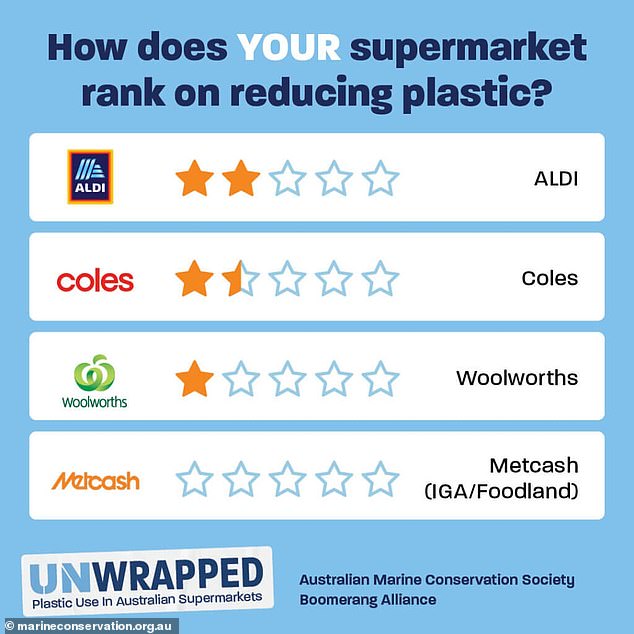
Aldi came first with two out of five stars, followed by Coles with a score of 1.5. Woolworths received one star, while Metcash (IGA and Foodland) received zero stars
The scores were compiled by assessing each supermarket’s performance in plastic reduction (40 percent of the score), recycling and reusable materials (20 percent of the score), with the remaining 20 percent consisting of policy categories of transparency and policy, planning and governance.
Most supermarkets have been reluctant to publicly release data on their packaging footprints, the report said.
AMCS Plastics Campaign Manager Shane Cucow said our oceans were choking on plastic, with an estimated 11 million tonnes entering the water every year – even though plastic has only been around for about 80 years.
“That figure is expected to triple by 2040 if we do not take action,” Cucow added.
‘Plastic packaging is one of the worst offenders, with soft plastics, food packaging and beverage waste making up almost 70% of all plastic found by Clean Up Australia volunteers. It’s time to seriously cut back on soft plastics and other hard-to-remove plastics. -recycle packaging.’
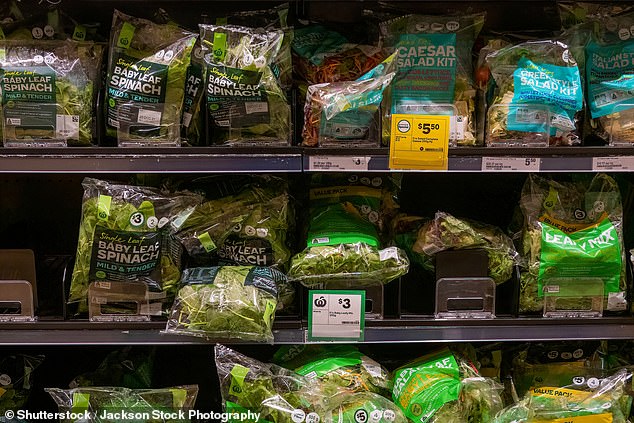
There are concerns about the transparency of major supermarket chains, with the report saying many have been reluctant to publicly release data on their packaging footprint
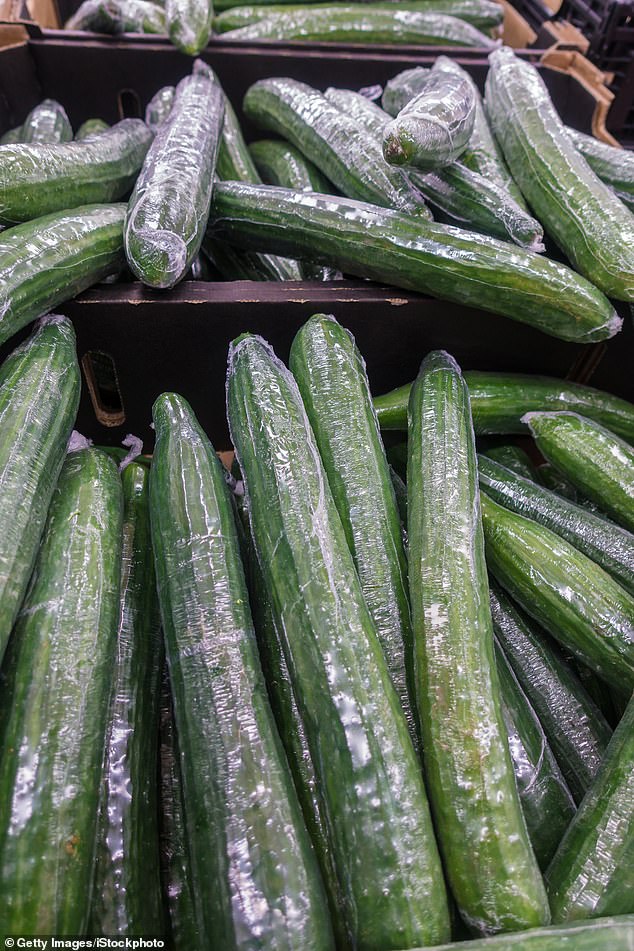
AMCS Plastics Campaign Manager Shane Cucow said an estimated 11 million tonnes of plastic ends up in our oceans every year
“We are pleased to see Aldi leading the way with specific targets to reduce plastic packaging, including a target to reduce plastic in the fresh produce section,” he continued.
‘It is extremely disappointing to see Woolworths lagging behind in third place due to the lack of clear targets to reduce plastic use and poor transparency around its plastic footprint.’
“As the largest retailer by market share, Woolworths should use its influence to push suppliers to reduce unnecessary plastic packaging,” Cucow argued.
Three out of four supermarkets responded to the report, with Aldi and Coles outlining their commitments to reducing plastic use and recycling.
Metcash promised to consider the report’s recommendations and look for improvements.
However, Woolworths called the findings ‘disappointing’ and claimed the research was based on incomplete data.
“As a result, it is not a reliable reflection of the sustainability of packaging at Woolworths,” a spokesperson told Ny Breaking Australia.
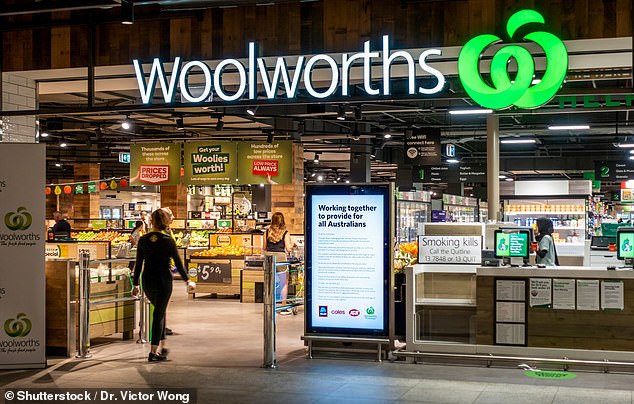
Woolworths called the results ‘disappointing’ and claimed the research was based on incomplete data
“We know there is still more to do, and we will continue to publish our packaging data to hold ourselves accountable for our progress, while encouraging our suppliers to do the same,” she added.
Woolworths said it has ‘lead’ the supermarket sector in removing everyday single-use plastic items, removing more than 1.4 million kilos of virgin plastic from its range since 2018.
“While we cannot mandate packaging changes for the other brands that supply us, we have issued guidelines on problematic materials and sustainable packaging to our suppliers to encourage them to make positive changes,” the spokesperson said.
‘The majority of our fruit and vegetable range is sold loose, but we do sell a number of packaged items to extend shelf life or to offer products in bulk.’
“In many cases, loose products will be cheaper than the packaged alternative, but when it comes to bulk packs of fruit or vegetables, by selling a large volume in one product we can often offer customers a lower price per piece.” they added.
Key data available in the annual Woolworths Sustainability Report report, audited by Deloitte, was not referenced in the AMCS report, the spokesperson claimed.
The research comes almost a year to the day the RedCycle recycling program ended following revelations that participating supermarkets were stockpiling soft plastics rather than processing them.
“Australia has a target to recover 70% of its plastic packaging by 2025, but recovery rates have stagnated at just 18%, with the increasing use of soft plastics a major concern,” Cucow said.
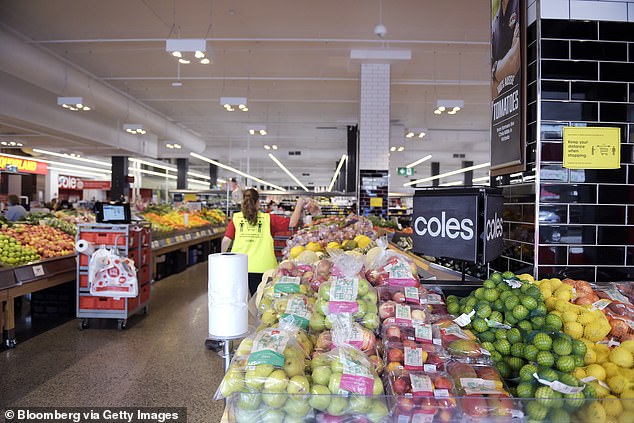
The research comes almost a year to the day the RedCycle recycling program ended following revelations that participating supermarkets were stockpiling soft plastics rather than processing them
“Even before the REDcycle collapse, Australia was able to process less than 5% of soft plastics annually.”
Supermarkets still have a lot of work to do, the campaign leader said, but every product manufacturer must also be held accountable for its packaging choices.
“Unless the government is willing to step in and regulate, many companies will continue to use unrecyclable and unsustainable packaging, undermining their competitors,” Cucow said.
‘We need clear laws on the use of packaging. We urge the Australian Government to set binding national plastic reduction targets to ensure all retailers do their fair share to reduce their impact on the environment.”
The report suggested the implementation of minimum measures, such as ensuring loose fresh produce is cost-competitive with plastic-wrapped produce, and eliminating plastic fruit stickers, produce bags and pre-packed straws and cutlery.
Boomerang Alliance director Jeff Angel said reuse and refill systems were a huge missed opportunity, with Aussies willing to embrace reusable everyday items such as bags, cups and bottles.
‘Supermarkets have a widespread presence and capabilities in reverse logistics, so we would like them to offer services such as beverage refill stations for milk and juice, BYO container options for the deli and dry goods, and truly plastic-free reuse options for laundry and cleaning products, he added.
